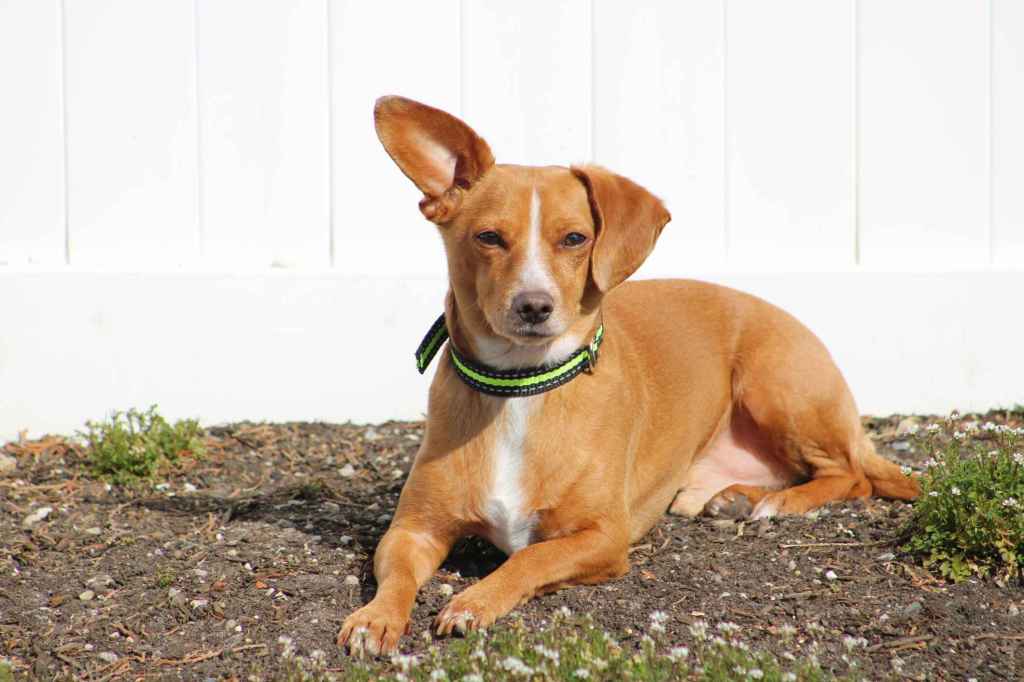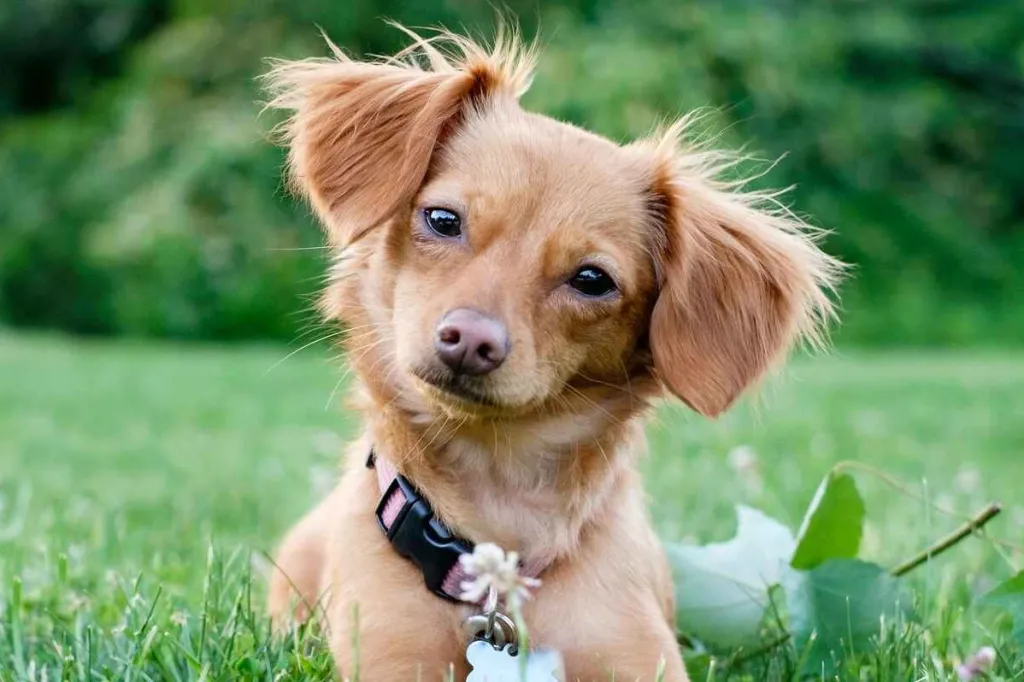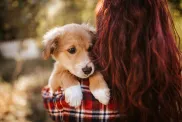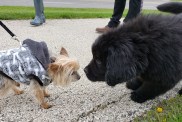The Chiweenie is a small cross between the Chihuahua and Dachshund dog breeds. Known for their playful, affectionate, and loyal temperament, these pups inherited some of the best traits from both of their parents. Chiweenies are also known by several names, including Choxie, Weeniehuahua, the German Taco, and the Mexican Hot Dog.
A relatively new hybrid breed, the Chiweenie was first bred in the United States in the early 1990s. These adorable pups make great apartment dogs for active urban dwellers. However, they are best suited to small or single-person households and tend to be yappy. If you’re looking for an energetic “firecracker” dog who will keep you on your toes and love you unconditionally, the Chiweenie may be the right dog for you!
Chiweenie characteristics
- Height: 8 to 10 inches at the shoulder
- Weight: 5 to 12 pounds
- Lifespan: 12. to16 years
Coat and color variations
Chiweenies display a wide range of coat and color variations due to their Chihuahua and Dachshund lineage. Their coats can be short and smooth, reflecting the sleek appearance of both parent breeds or longer if they inherit a long-haired gene, especially from the Chihuahua side. Some rare Chiweenies may even have a wire-haired coat if the Dachshund parent carried that trait.
In terms of color, Chiweenies can come in solid shades like black, brown, cream, chocolate, or white. They may also exhibit bicolor patterns such as black and tan, brown and tan, and even tricolor combinations like black, tan, and white. Additionally, some Chiweenies may have more complex coat patterns, such as brindle, which features a mix of lighter and darker stripes, or the dapple pattern, characterized by irregular spots, often inherited from the Dachshund.
What does a Chiweenie look like?
Because of their unique genetic makeup, it’s never certain which parent the Chiweenie will take after more. Typically, this hybrid breed is small-sized, with a long and low body similar to the Dachshund.

Physical traits and attributes
- Size: Small to medium-sized, generally ranging between 5 to 12 inches tall and weighing 5 to 12 pounds.
- Body: Long and low body, typical of the Dachshund, with short legs. Some may have a more compact body depending on which parent’s genes are dominant.
- Head: Typically a small, rounded head (Chihuahua-like) or a slightly elongated head (Dachshund-like).
- Ears: Ears can be large and erect (like a Chihuahua) or floppy and hanging down (like a Dachshund). Some may have semi-erect ears.
- Eyes: Large, expressive eyes. Colors can vary, including brown, black, or blue.
- Tail: The tail can be long and straight (Dachshund) or shorter and more curled (Chihuahua).
Chiweenie personality
Chiweenies are known for their lively, spirited, and affectionate personalities. They are typically energetic and playful, often displaying a strong sense of loyalty toward their families. While they may be small in size, they have big personalities and are known to be fearless, making them good watchdogs despite their small stature. Chiweenies tend to form strong bonds with their owners and may become quite attached, often following their favorite person around the house. Due to their loyalty, they can sometimes develop separation anxiety if left alone for too long.
Chiweenies are also intelligent and curious, though they can have a bit of a stubborn streak, especially if they inherit the independent nature of the Dachshund. Early socialization and consistent training are important, as Chiweenies may be wary of strangers or unfamiliar animals, and they can be vocal at times, alerting their owners to anything unusual. Despite this, they are generally affectionate and thrive on attention, often enjoying cuddle time with their owners. Their playful energy makes them great companions for active individuals or families, although their small size makes them more suited for indoor living.
Chiweenie behavior and temperament
- Energetic and playful
- Loyal and highly attached to their owners
- Fearless, often making good watchdogs
- Intelligent but can be stubborn
- Can develop separation anxiety when left alone for long periods
- Wary of strangers or new animals
- Affectionate and love attention
- Can be vocal, barking to alert their owners
- Thrive in indoor environments and with plenty of companionship
Training and socialization
Early socialization and positive reinforcement training are crucial due to their intelligence and potential stubbornness. Of course, their intelligence allows them to pick up commands quickly, so early training is key to establishing good behavior from the start. Use praise, treats, and affection to reward desired behavior. Chiweenies respond well to positive reinforcement, and this approach will keep them motivated and engaged.
Training tips
- Be Consistent: Consistency is crucial in training. Use the same commands and routines to avoid confusion. This helps your Chiweenie understand what is expected of them.
- Keep Training Sessions Short and Fun: Chiweenies are intelligent but can lose interest if training sessions are too long or repetitive. Keep sessions short (10-15 minutes) and engage with varied activities.
- Mental Stimulation: Incorporate puzzle toys, obedience training, and interactive games into their routine to challenge their mind. A bored Chiweenie can become restless or destructive. Once basic obedience is established, teach more advanced commands or tricks. Their intelligence makes them excellent candidates for agility training, fetch, or scent games.
Chiweenie care
Caring for a Chiweenie involves attention to their grooming, exercise, feeding, and health needs to ensure they stay healthy and happy. Given their small size and playful nature, they are relatively low-maintenance compared to larger breeds, but they do require consistent care, especially in grooming, dental health, and exercise.
How to groom a Chiweenie
By maintaining a consistent grooming and care routine, your Chiweenie will look and feel their best! While they’re pretty low-maitenance in regards to grooming, there are some requirements specific to their needs.
Brushing
- Short Coat: For short-haired Chiweenies, brushing once a week is sufficient to remove loose hair and keep the coat sleek.
- Long Coat: Long-haired Chiweenies should be brushed 2-3 times a week to prevent tangles and matting. A slicker brush or comb designed for longer coats will work best.
- Wirehaired Coat: If your Chiweenie has a wiry coat, brushing 2-3 times a week is recommended, along with occasional hand-stripping (a grooming technique for wirehaired dogs) to maintain their coat’s texture.
Additional grooming needs
- Bathing: Chiweenies should be bathed every 4-6 weeks, or as needed if they get dirty. Use a gentle, dog-friendly shampoo to keep their skin and coat healthy. Over-bathing can dry out their skin, so avoid excessive baths.
- Nail Trimming: Regular nail trimming is essential, as Chiweenies’ nails grow quickly. Aim to trim their nails every 2-4 weeks to prevent overgrowth and discomfort. If you can hear their nails clicking on the floor, it’s time for a trim.
- Ear Cleaning: Chiweenies can be prone to ear infections, so their ears should be checked and cleaned regularly. Use a vet-approved ear cleaning solution to wipe out any dirt or wax buildup, and keep their ears dry to prevent infections.
- Dental Care: Due to their small mouths, Chiweenies are prone to dental issues, so daily or at least weekly tooth brushing with dog-safe toothpaste is crucial. Providing dental chews can also help maintain good oral hygiene.
- Coat Shedding: Chiweenies may shed moderately, especially if they have a double coat. Regular brushing can help control shedding and keep their coat looking healthy.
Flea, tick, and parasite control
Keep up with flea and tick prevention treatments, especially if your Chiweenie spends much time outdoors. Regular grooming allows you to spot parasites early.
Early acclimation is key
Getting your Chiweenie accustomed to grooming procedures from a young age makes the process easier and more enjoyable for both of you. Handle their paws frequently, examine their mouth and ears, and reward them for good behavior during grooming sessions. This positive foundation sets the stage for stress-free veterinary exams and handling throughout their lives.

Chiweenie feeding and nutrition
Feeding a Chiweenie involves providing a well-balanced, high-quality diet that meets their unique needs as a small, active breed. Proper nutrition is key to keeping your Chiweenie healthy, maintaining their ideal weight, and ensuring good energy levels. Here’s a guide to their feeding and nutrition:
Portion sizes
- Adult Chiweenies: On average, Chiweenies need about ½ to 1 cup of food per day, divided into two meals. The exact amount will depend on their weight, age, and activity level.
- Puppies: Chiweenie puppies need more frequent meals, about 3-4 times a day, with portion sizes adjusted for their growth. Always follow your vet’s advice on portion sizes for puppies to ensure healthy development.
Types of food
- Dry Kibble: High-quality dry kibble formulated for small breeds is a great choice for Chiweenies. Small-breed formulas often have smaller kibble pieces that are easier for them to chew and digest.
- Wet Food: Wet food can be added as a topper or occasionally mixed into their kibble. However, be cautious with wet food as it can be high in fat and calories.
- Homemade/Raw Diets: If considering homemade or raw diets, always consult your vet to ensure the meals are nutritionally balanced and meet your Chiweenie’s needs.
Nutritional needs
- Protein: As a small but energetic breed, Chiweenies need a diet rich in high-quality animal protein, such as chicken, turkey, fish, or lamb. Protein supports muscle health and energy levels.
- Fats: Healthy fats, like omega-3 and omega-6 fatty acids from sources like fish oil, are important for maintaining a healthy coat, skin, and overall energy. However, be mindful of too much fat, as Chiweenies can easily gain weight.
- Carbohydrates: Carbohydrates provide energy but should come from healthy sources such as sweet potatoes, brown rice, or oats. Avoid fillers like corn and soy.
- Fiber: Fiber aids digestion and keeps their digestive system running smoothly. Ingredients like pumpkin, sweet potatoes, or vegetables are good sources of fiber.
- Vitamins and Minerals: A balanced diet should include essential vitamins and minerals, such as calcium (for bone health), and antioxidants (for immune health).
Watch for overfeeding and obesity
Chiweenies are prone to weight gain due to their small size and sometimes less active indoor lifestyle. Monitor their weight and adjust portion sizes if you notice they’re gaining too much weight. Avoid free-feeding (leaving food out all day), as this can lead to overeating. Stick to a set feeding schedule and control portion sizes.
Chiweenie and family compatability
Chiweenies can make excellent family companions, though their compatibility with different types of families depends on their personality and upbringing. In families with children, Chiweenies are generally affectionate and playful, making them good companions for older, respectful kids. They enjoy engaging in activities and often bond closely with children, seeking attention and companionship. However, due to their small size and delicate nature, Chiweenies may not be the best fit for households with very young or rambunctious children, as rough handling can make them feel anxious or threatened. It’s important to teach children to be gentle and respectful when interacting with these small dogs.
For couples or single individuals, Chiweenies are ideal pets, as they thrive in smaller households where they receive focused attention and affection. They tend to form strong bonds with one or two people. Their small size also makes them well-suited for apartment living. However, because of their attachment, Chiweenies can become clingy and may develop separation anxiety if left alone for extended periods. They do best in homes where someone is around most of the time or in families that can arrange for a pet sitter when they’re away for long periods.
Are Chiweenies good with other pets?
Chiweenies can live peacefully with other pets, especially if socialized early. They are often friendly with other small dogs and may even enjoy having a playmate. However, their Chihuahua and Dachshund ancestry may cause them to display territorial or dominant behavior toward other animals, especially larger dogs. Early socialization and careful introductions are key to fostering a harmonious relationship in multi-pet households. Chiweenies have moderate exercise needs, making them adaptable to various lifestyles. Families who enjoy short daily walks or indoor playtime will find them easy to manage, and their small size makes them well-suited for apartment living or homes with limited outdoor space.
Chiweenie health issues
The Chiweenie breed is predisposed to some of the same conditions that the Chihuahua and Dachshund also face. While most are generally healthy, some may be prone to a few health issues, which is why it is important to maintain good care and regular veterinary checkups. Some of the more common health problems Chiweenies suffer from include:
- Hypoglycemia: You may know this as low blood sugar. This is due to the Chiweenie’s small stomach and is a problem they share with their Chihuahua parents.
- Diabetes: Often the next condition to develop after hypoglycemia. Discuss this with your veterinarian. Dogs with diabetes require lifelong treatment.
- Degenerative disc disease: This condition causes issues with the spine and can lead to serious injuries or paralysis. Dachshunds also suffer from this problem. It is important to limit activities that will be strenuous on the spine. Jumping or climbing aren’t the safest exercises for these dogs.
- Dental issues: This is a common problem among small dog breeds. Maintain good oral hygiene and a proper diet, and get regular professional teeth cleanings to prevent these issues.
- Hypothyroidism: An under-active thyroid. Your veterinarian can determine if your dog suffers from this issue and prescribe treatment.
- Knee and joint issues: This is a common problem among many breeds, especially as dogs age.
Chiweenie rescue groups
It may be hard to come across a rescue organization solely dedicated to the Chiweenie hybrid breed. However, you can also start your search with Chihuahua or Dachshund breed-specific rescues. Often, many mixed breeds, including Chiweenies, may end up in these rescues. Here are a few to get you started:












